Note: This is the sixth article for Progressive Dairyman about dairy culture. Since we first offered organizational culture inventory (OCI) assessments to dairy producers and their teams, data has been collected from 37 U.S. dairies including more than 600 participants.
We’ve learned much about culture on these dairies and the role it plays in a farm’s success. We’ve come to understand more about the differences in how employees view and value cultural styles and the components that make up their individual OCIs.
Two of the most strikingly unique groups are those who completed the surveys in English and those who completed them in Spanish.
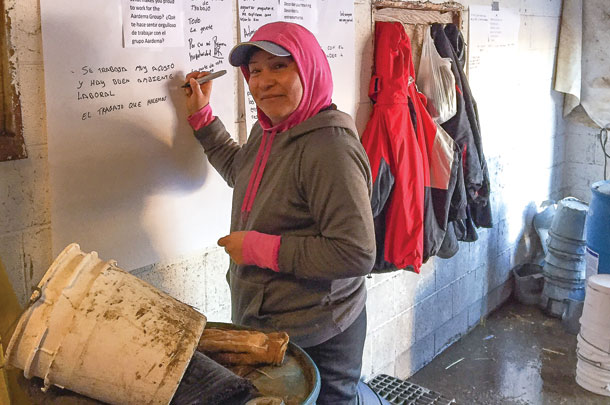
This article highlights the differences and measures being taken on dairies to address these two important dairy culture groups. Our end goal is to build cultures that attract and retain the best employees.
The OCI circumplex (see “The measure of a dairy’s culture,” published in Progressive Dairyman, Sept. 30, 2015) highlights the differences between participants who completed the surveys in Spanish and those who completed the surveys in English.
Current vs. ideal
Figure 1 shows how all survey participants perceived their “current” culture. Participants completing the current culture surveys in English indicated their cultures were primarily “Oppositional” and “Dependent.”
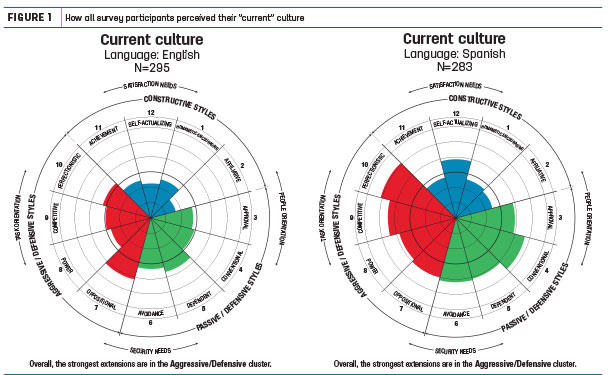
The perceived expectations for success in these cultures are to:
- Identify problems
- Be objective
- Follow orders
- Check decisions made with superiors
Meanwhile, participants who completed the Spanish version indicated their current cultures were “Perfectionistic” and “Conventional.” They indicated that:
- Work is their most important endeavor.
- They must do all things perfectly.
- They strive to avoid conflict.
- They want to follow protocols.
They also indicated in the constructive style a significant peak for self-actualization – the desire to learn and grow.
A second survey determined all participants’ “ideal” culture. See Figure 2. Participants who completed the English version want an ideal culture that is Humanistic-Encouraging and Self-Actualizing.
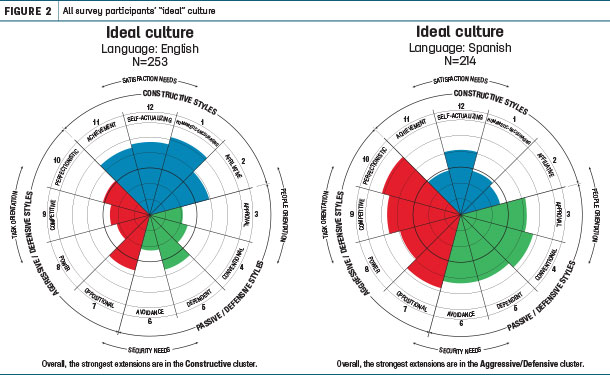
These are constructive cultures where there is good listening, conflicts are dealt with constructively, people are encouraged, work is done well, integrity is high, and they enjoy their work.
Participants completing the Spanish version indicated their ideal culture was “Perfectionistic” and “Oppositional.” Again, these individuals felt work is their most important endeavor, and they must do all things perfectly, coupled with identifying problems and being objective.
Figure 3 shows the negligible growth of the Constructive Style with those who completed the OCI in Spanish compared to those who took the survey in English.
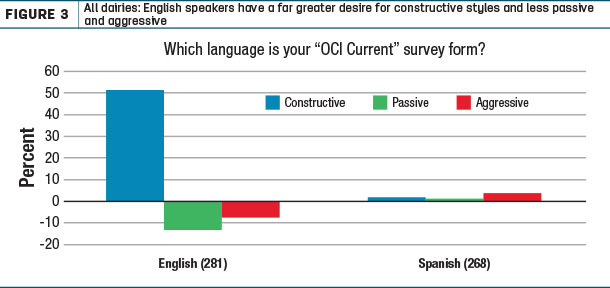
Contrasting results
English-speaking employees have expectations of being engaged at a higher level of leadership. In general, the largest gaps between the current and ideal cultures are at dairies where conflicts are not dealt with constructively, people are not involved in decisions that affect them, people are not positively rewarded for good work, people are not treated as more important than things, and good human relationship skills are not employed.
It’s intriguing that Spanish speakers showed minimal desire for a more Constructive Style culture. Numerous factors may account for this phenomenon, including education levels, limited experience with cultures where personal growth and learning is expected, risk aversion, a different perspective on what is high performance, as well as immigration policies and rhetoric that creates uncertainty.
Nevertheless, these two different outcomes raise important questions for dairy managers:
- Why is there very little growth in the Constructive culture from “Current” to “Ideal” for Spanish-speaking participants?
- Why do participants completing the survey in Spanish prefer the “Perfectionistic” style and believe migrating to “Oppositional” is ideal?
Cultural hints
Beginning in the 1960s, social psychologist Dr. Geert Hofstede conducted a global cultural study based on an IBM database. These results have been refined over the years. Below is a comparison of Mexican and U.S. cultures based on that data which may provide insight regarding recent OCI dairy survey responses.
Based on Hofstede’s work and illustrated in Figure 4:
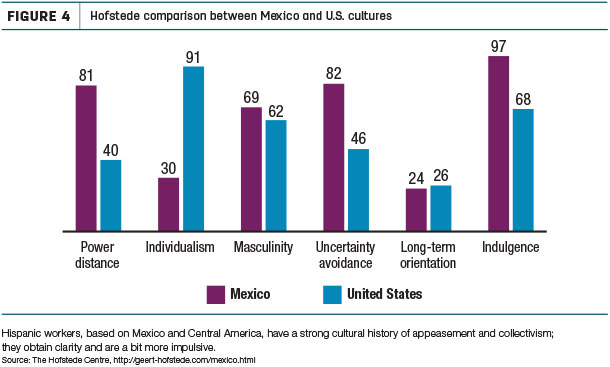
- People in Mexico are generally more accepting of hierarchical order, which is “Power Distance.”
- Regarding “Individualism,” people in Mexico prefer greater levels of a tightly knit societal framework where family and friends look after each other in exchange for loyalty. People in the U.S. tend to focus more on “I,” and people from Mexico tend to focus more on “we.”
- Individuals in both Mexico and the U.S. lean toward “Masculinity,” where society’s preference is achievement, heroism, assertiveness and material rewards for success.
- Mexico ranks higher for “Uncertainty Avoidance,” being less comfortable with uncertainty and ambiguity, and less tolerant of unorthodox behaviors and ideas.
- Both Mexico and the U.S. have, in general, a “Short Team Orientation” and prefer to maintain time-honored traditions and view societal change with suspicion.
- Finally, regarding “Indulgence,” Mexico is higher, with a culture that allows relatively free gratification of basic and natural human drives to enjoy life and have fun.
Given these findings, it’s understandable that Spanish speakers who took the OCI survey will likely seek an ideal culture that’s “Conventional” and “Perfectionistic” to reduce risk and maintain their jobs.
These data suggest Spanish-speaking employees are often more comfortable in transactional environments. In other words: “If you do this, you will get this.” The typical hierarchical farm employment management style reinforces these cultural norms.
The 2016 IMD World Competitiveness Yearbook measures regulations, infrastructure, inclusion, prosperity and quality of life. It places the U.S. third, behind Hong Kong and Switzerland. Mexico ranked 45 on the list.
Further, the 2016 Freedom House measurement of political rights and civil liberties indicates that the U.S. and Canada are in free status and exhibit the highest levels for both political rights and civil liberties. But countries such as Mexico, Honduras, El Salvador and Guatemala score lower for these same parameters.
As a result, Spanish-speaking employees on dairies often come from significantly different levels of social participation in business, community life and political engagement.
Knowing this, we have the opportunity, through deep engagement, to solicit their ideas and solutions, build new levels of retention and attract new employees. Ultimately, the majority of employees, regardless of origin, want stability, to enjoy their work, learn, grow, use their intellect as well as muscle and value loyalty to and from their employer.
Dairies can create Constructive cultures that attract and retain the best employees. And when this occurs, farms are more likely to experience greater animal welfare, higher milk quality, greater profitability and less stress for employees, owners and leaders. ![]()
PHOTO: Dairies that want to build cultures that attract and retain the best employees must understand cultural differences between U.S. and Hispanic employees. Courtesy photo.
Monty Miller is the owner of International Performance Solutions, a consulting practice that engages in training, development and organizational change. Neil Michael is a veterinarian and the global technical services manager for Arm & Hammer Animal Nutrition.
Monty Miller is with International Performance Solutions Ltd.
References omitted but are available upon request. Click here to email an editor.
Engage to change your dairy culture
To encourage more constructive and transformative behaviors, Aardema Dairy in Wendell, Idaho, and Pagel’s Ponderosa Dairy in Kewaunee, Wisconsin, have employed deep engagement of employees. Their desire is to find ways to enhance the culture to aid the recruitment and retention of employees.
These farms use bilingual focus groups to understand employees’ perspectives on numerous topics on their dairies, for example:
- How satisfying is your work?
- How well do you understand your responsibilities?
- Are you receiving the training and explanations to do your job?
- How confident do you feel when performing your job?
- Do you feel there is good communication with your manager and peers?
- Do your manager and peers help you do your job better?
- Do you feel respected by your manager and peers?
- How do we create a stronger team?
When the farms first began these sessions, initial observations found that employees were surprised to be asked these questions. They were being engaged with as opposed to being told what to do. It took them a few minutes to adjust to the discussions and to get their ideas on paper.
Once participants recognize there is a desire to learn their perspectives, they create transformative output, as has been the experience at Aardema Dairy and Pagel’s Ponderosa Dairy.
When employees were asked, “What is the value of working as a team in the parlor?”, their answers helped shape a more cohesive team and improved the dairy’s culture.





